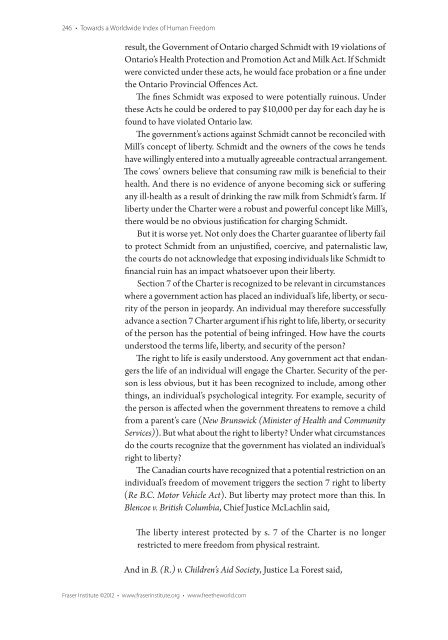Towards a Worldwide Index of Human Freedom
Towards a Worldwide Index of Human Freedom
Towards a Worldwide Index of Human Freedom
Create successful ePaper yourself
Turn your PDF publications into a flip-book with our unique Google optimized e-Paper software.
246 • <strong>Towards</strong> a <strong>Worldwide</strong> <strong>Index</strong> <strong>of</strong> <strong>Human</strong> <strong>Freedom</strong><br />
result, the Government <strong>of</strong> Ontario charged Schmidt with 19 violations <strong>of</strong><br />
Ontario’s Health Protection and Promotion Act and Milk Act. If Schmidt<br />
were convicted under these acts, he would face probation or a fine under<br />
the Ontario Provincial Offences Act.<br />
The fines Schmidt was exposed to were potentially ruinous. Under<br />
these Acts he could be ordered to pay $10,000 per day for each day he is<br />
found to have violated Ontario law.<br />
The government’s actions against Schmidt cannot be reconciled with<br />
Mill’s concept <strong>of</strong> liberty. Schmidt and the owners <strong>of</strong> the cows he tends<br />
have willingly entered into a mutually agreeable contractual arrangement.<br />
The cows’ owners believe that consuming raw milk is beneficial to their<br />
health. And there is no evidence <strong>of</strong> anyone becoming sick or suffering<br />
any ill-health as a result <strong>of</strong> drinking the raw milk from Schmidt’s farm. If<br />
liberty under the Charter were a robust and powerful concept like Mill’s,<br />
there would be no obvious justification for charging Schmidt.<br />
But it is worse yet. Not only does the Charter guarantee <strong>of</strong> liberty fail<br />
to protect Schmidt from an unjustified, coercive, and paternalistic law,<br />
the courts do not acknowledge that exposing individuals like Schmidt to<br />
financial ruin has an impact whatsoever upon their liberty.<br />
Section 7 <strong>of</strong> the Charter is recognized to be relevant in circumstances<br />
where a government action has placed an individual’s life, liberty, or security<br />
<strong>of</strong> the person in jeopardy. An individual may therefore successfully<br />
advance a section 7 Charter argument if his right to life, liberty, or security<br />
<strong>of</strong> the person has the potential <strong>of</strong> being infringed. How have the courts<br />
understood the terms life, liberty, and security <strong>of</strong> the person?<br />
The right to life is easily understood. Any government act that endangers<br />
the life <strong>of</strong> an individual will engage the Charter. Security <strong>of</strong> the person<br />
is less obvious, but it has been recognized to include, among other<br />
things, an individual’s psychological integrity. For example, security <strong>of</strong><br />
the person is affected when the government threatens to remove a child<br />
from a parent’s care (New Brunswick (Minister <strong>of</strong> Health and Community<br />
Services)). But what about the right to liberty? Under what circumstances<br />
do the courts recognize that the government has violated an individual’s<br />
right to liberty?<br />
The Canadian courts have recognized that a potential restriction on an<br />
individual’s freedom <strong>of</strong> movement triggers the section 7 right to liberty<br />
(Re B.C. Motor Vehicle Act). But liberty may protect more than this. In<br />
Blencoe v. British Columbia, Chief Justice McLachlin said,<br />
The liberty interest protected by s. 7 <strong>of</strong> the Charter is no longer<br />
restricted to mere freedom from physical restraint.<br />
And in B. (R.) v. Children’s Aid Society, Justice La Forest said,<br />
Fraser Institute ©2012 • www.fraserinstitute.org • www.freetheworld.com


